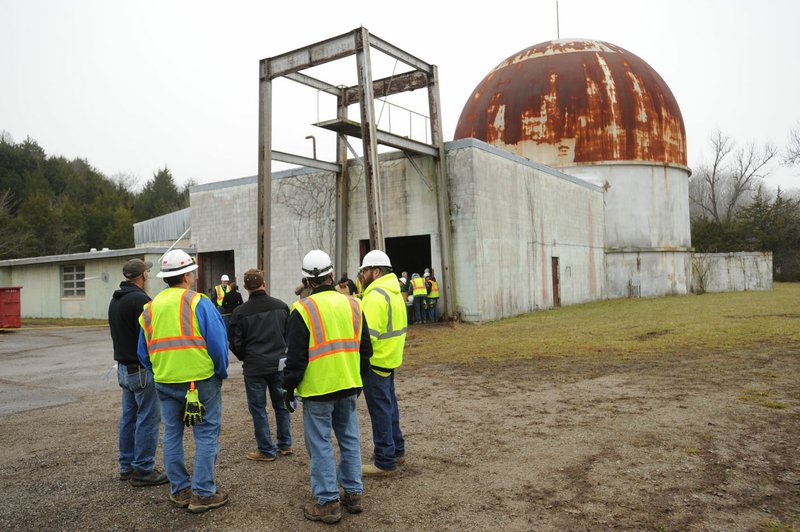FAYETTEVILLE -- The city will process in the public sewer system about 70,000 gallons of wastewater from the site of a former nuclear reactor after a council vote Tuesday.
Council members voted 4-2, with Mayor Lioneld Jordan casting the needed fifth affirmative vote, to take groundwater collected in two support facilities at the Southwest Experimental Fast Oxide Reactor in Strickler. Aldermen Alan Long and John La Tour, both of Ward 4, voted "no" on the proposal.
Next meeting
When: 5:30 p.m. May 16
Where: Room 219, City Hall
113 W. Mountain St.
The University of Arkansas, which owns and operates the site, will haul about 70,000 gallons from Strickler to a manhole near Baum Stadium on university property. A contractor with the university and the Arkansas Department of Health tested the water, finding it far below the threshold for what's considered safe.
Mike Johnson, associate vice chancellor of facilities at the university, gave a history of the site to the council. The reactor, purely experimental, never produced fuel and operated from 1968 to 1972. The university took ownership of it in 1975 for research purposes. By 1986 it fell out of use.
The city accepted 38,000 gallons of wastewater in 2011 from the same site. Levels of tritium, a radioactive form of hydrogen, were higher then but still way below safe levels for drinking water, Johnson said. A minuscule amount of asbestos was found in the 2011 water, which has since been abated, he said.
The university could have dumped the water onto the ground but wanted to go through a proper process and be transparent about it, Johnson said.
"The water -- other than treating for biologicals, I would drink that water," he said.
The detected amount of tritium in this round of wastewater is about 1,000 times less than the regulated amount allowed in a municipal sewer system, said Denise Georgiou with CH2M Hill, which operates the city's wastewater treatment facilities.
The water will flow through the city's Noland wastewater treatment plant, into the White River and eventually into Beaver Lake, the region's primary source of drinking water, said Tim Nyander, city utilities director.
La Tour said he saw no good reason to put the wastewater into the city's system if it could go somewhere else. Long echoed those sentiments and cited constituents concerns against the proposal.
Four members of the public spoke on the matter, three against and one for it.
Alderman Mark Kinion, who serves as chairman of the Water, Sewer and Solid Waste Committee, said he reviewed the data provided to the committee and felt comfortable with the results. He said he'd rather put the water into the system so the city could monitor it.
"The public outcry and alarm is based on semantics," Kinion said. "Anytime you hear 'radioactive' there is a semantic reaction of alarm. I'm taking away the semantics and looking at the science."
In other business, the council approved 5-1 changes to the city's back flow ordinance. La Tour dissented. The changes would require residents with swimming pools that have automatic filling systems, underground irrigation systems or installed fire suppression systems to get their back flow preventers checked annually. Nyander said the ordinance would affect about 6,800 customers.
Average price to get a back flow preventer checked runs $30 to $100. The ordinance follows what the state recommends in its plumbing code, Nyander said.
The council left on its first reading a proposal to rezone just shy of 2 acres at Crossover Road and Hearthstone Drive. Public comment went on for more than an hour. Dozens of residents, mainly from the Stonewood subdivision to the north, spoke against the proposal in two previous Planning Commission meetings. The commission forwarded the rezoning to the council by an 8-1 vote with a recommendation of approval.
Alderman Justin Tennant said at the onset he wanted to hold off on a vote because two council members were absent. The proposal would change the zoning from a residential office district to neighborhood services general. Much of the public discussion revolved around a pizzeria that would move in after the rezoning.
"For people who are just saying you can't let a pizza place in there, you've got to think way past that," Tennant said, speaking of the potential development in the area.
Resident Craig Collins, a first-time home buyer with his wife, lives across from the property separated by a brick wall. He worried about noise from live music on the restaurant's patio, unpleasant odors and bright lights coming into his family's house. He worried the development would pose a safety risk to his 6-year-old daughter.
"They probably have other choices where they can operate in the city, but we don't," Collins said.
The council tabled for two weeks a proposal to sell about 5 acres in south Fayetteville to Brian Faught for $75,000. Faught's AR-Canna LLC would bring a marijuana manufacturing facility to an otherwise empty plot of land in the Commerce District.
Plans call for a 30,000-square-foot cultivation and processing plant and 5,000-square-foot office building. Faught asked the council to table the item so he could work with the city's staff to make revisions to the plan. A high-pressure gas line was found on the perimeter of the property, requiring an adjustment of the access easement, Chief of Staff Don Marr said.
Faught anticipates hiring 35 to 40 hourly employers with a starting wage of $15 per hour, three to five managerial employees with a $50,000 to $70,000 salary and two senior managers making $75,000 to $125,000 per year.
The Arkansas Medical Marijuana Amendment, as approved by voters, allows up to five cultivation facilities in the state. The Medical Marijuana Commission has to grant licenses to manufacturers and dispensaries. The application period will open July 1.
NW News on 05/03/2017

